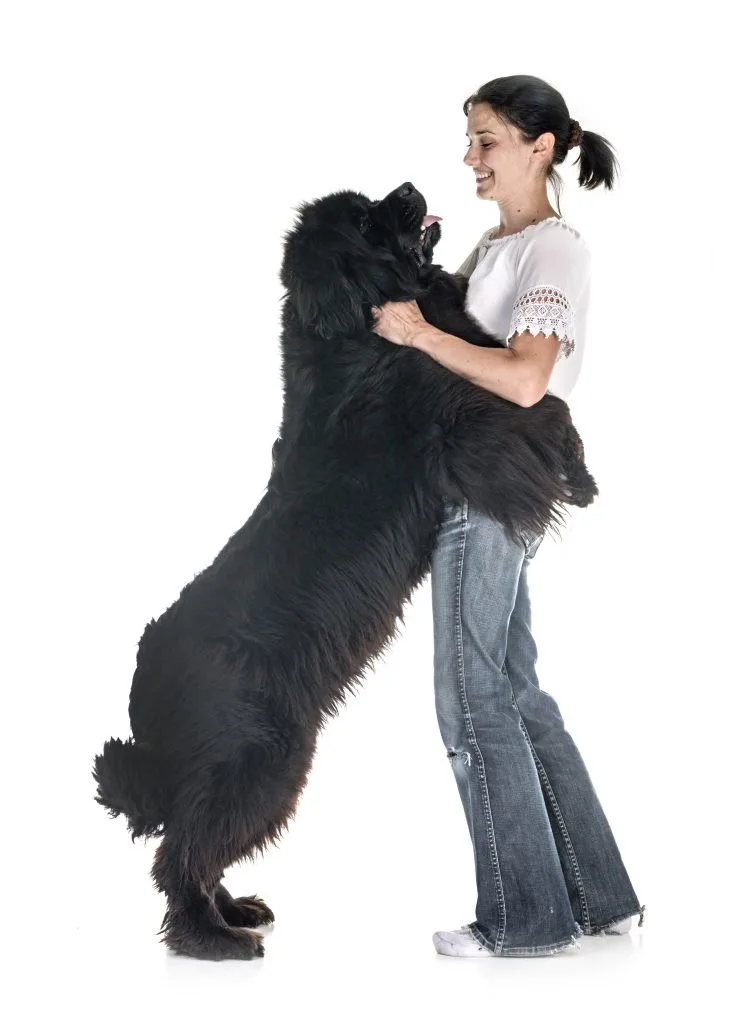Are Newfoundlands Aggressive?
Newfoundlands are known for their docile nature and sweet disposition.
They are also known to love attention and are faithful to their owners.
But are newfoundlands aggressive?
According to the Cambridge Dictionary, aggressive technically has 2 meanings.
- -behaving in an angry and violent way toward another person.
- -determined to win or succeed and using forceful action to win or to achieve success
In my experience, Newfies can definitely be aggressive in the latter definition.
Have you ever been stalked by a Newfie when it’s close to dinner time?
Have you ever been heavily persuaded by a Newfie to go for a walk or a swim?

If you own a Newfie, most likely you answered yes to those questions, however, we don’t associate this with aggressive behavior rather it’s just the Newfie way.
So are Newfoundlands aggressive in the traditional violent way?
No.
Most Newfies are generally not aggressive.
However, since the Newf is a dog, they definitely can be aggressive in certain circumstances if they have not been trained properly at an early age.
Other reasons that a Newfoundland dog might be aggressive are anxiety, injury, or a medical condition.
Newfoundland Dog Temperament
The most important characteristic of a Newfoundland is not its size, color, fur, or drool but their sweet temper and loyalty.
Adult Newfies are calm, sweet and a wonderful companion for their family.
They are a working dog and are happiest when they are with their people.
When properly trained, they are wonderful with young children BUT if training is lacking a growing Newfie can be a handful for families with young children.
Newfoundland puppies are nippy and full of energy.
They also grow fast so training and socialization should begin the day that they come home and unwanted behaviors such as biting, growling, resource guarding, and unnecessary barking should be corrected immediately.
Newfies are smart and easy to train but their training must to be ongoing throughout their life or they may become bored and destructive.
Adolescent Newfies can be a lot to handle and need adult supervision, training, exercise, and an owner that can be assertive with clear communication.

Newfoundlands are loyal to their families and they want to please so it’s super important that you provide them with clear instructions of what behavior is acceptable and what is not.
Also, most Newfies do not respond well to harsh punishment so it’s important to establish how you will deal with negative behavior without causing your Newfie to shut down.
What can I say?
They’re a complex breed but you will figure out what works and what doesn’t work for your Newfoundland in no time!
Happy Newfie, happy life!
Are Newfoundland Dogs Protective?
Even though the Newfoundland is a friendly, social, and laid back breed, they can be protective of their families.
They aren’t a protective breed in a traditional sense where they will attack any intruder that walks in the door but they will put themselves between their family and danger.
This is one of the reasons that the Newfie is often referred to as a “nanny dog.”
They are also water rescue dogs so they do have that instinct to rescue.
This could be in form of aggressively licking your face when you’re snoring too loud on the couch or jumping into icy waters to save you from drowning.
Why Would A Newfoundland Show Signs Of Aggression?
Newfoundlands are not considered an aggressive breed of dog but any dog has the potential to be aggressive in certain circumstances.
Newfie puppies are notorious for nipping and growling but this can be easily fixed with training and socializing.
Puppies are just learning and need to be taught what is acceptable behavior and what is not.
They also need to be exposed to as many things as possible when they are young so that they are confident adults.
The most common reasons why an adult Newfoundland will show aggression are fear, pain and other dogs.
Fear
Fear can make any dog act aggressively either by biting, lunging, or growling.
Fear can come in many different forms such as anxiety, pain, sickness or the fear of the unknown.
Common dog fears are loud noises such as fireworks and thunder, going to the vet, riding in the car, other dogs, fear of men, strangers, new places, the vacuum cleaner, the dog dryer, baths, etc.
Pain
Even the most gentle Newfoundland can bite or growl if they are in pain and at some point in time your Newfie is going to be in pain.
The problem with Newfies and pain is that most Newfies are very stoic so it’s hard to tell when they’re in pain until they’re in A LOT of pain.
This pain can come from growing pains in puppies, arthritis in older dogs, torn ligaments, broken bones, cuts and bruises, ear infections, mats in their coat, and internal injuries that we can’t see such as problems with the intestines, cancer, and even brain tumors.
Leroy bit my head once when I was trying to help him up. I would never consider him an aggressive Newfoundland because of this.
He was in pain and that was his way of telling me.

Other Dogs
If you’re taking your Newfoundland out in public they are going to encounter other dogs.
It’s common for dogs to be curious about each other and they usually sniff, lick, and sometimes nip at new dogs.
Sometimes these interactions will not go well and a dog fight will take place.
Most Newfies aren’t going to fight back, it’s not in their nature but they will defend their owners and some will defend themselves.
Smaller dogs are usually the biggest offenders of this because they get defensive when larger dogs are around.
An intact male dog may show aggression towards another male dog when a female is in heat nearby.
It can also be possible for a male dog to become aggressive with another intact male dog in the home when fighting for dominance.
Resource Guarding
A common behavior problem seen in the Newfoundland breed is resource guarding.
Some Newfies have been known to resource guard their humans, food, toys and other pets in the home.
Bad Breeding
There’s a lot that goes into planning a successful litter. Good Newfie breeders not only look at health and structure but also temperament.
No matter how amazing a dog looks, if their temperament is in question, they will not take the risk of passing that on.
Bad breeders don’t care.
They are breeding for a profit only, not for the betterment of the breed
Vet Visits
Visits to the veterinarian are how many dogs become labeled aggressive.
The vet office is often associated with prodds, pokes, and sometimes pain.
While some dogs might be happy to see their favorite veterinarian staff members, others would rather not.
This can lead to growling, teeth showing, and even biting.
It’s important to try and make the vet office fun and rewarding if possible.
Uncomfortable Situations
Just like people, dogs will encounter many uncomfortable situations in their life.
The difference is that humans can walk away whereas many dogs are forced to stay in these situations.
These situations can be new places, new sounds, and even new movements.
Newfies literally stop traffic and their presence makes people smile.
They are often surrounded by strangers and small children running up to their faces and petting them.
Most Newfs are going to do fine with this because they are used to it and love affection but some are timid and people should respect that.
It’s important for our Newf’s protection and for the protection of the people around us that we take the time to educate them on how to properly greet a dog.

How To Prevent Aggression In Newfies
It’s important to remember that while the Newfoundland is known to be a gentle giant, any dog can bite and growl.
This is the way that dogs communicate to us that they don’t like something.
Growling is a warning.
Biting is unwanted behavior.
Newfies need to be trained and taught early on what is acceptable behavior and what is not.
Teaching basic commands such as sit, stay, come, trade and leave it are great starting points but these commands should always be enforced.

Training
Most people think that training only takes place when the dog is a puppy but Newfies are smart.
They will pick things up quickly and they should be allowed to continue to learn.
Don’t stop training at the basic commands, keep going and going.
Enlist the help of a professional trainer if you’re stuck or want more.
Positive Reinforcement
Your Newfie needs to know what you want so you have to communicate that to them clearly and consistently.
Reward positive behavior.
If you have a stubborn Newfie you might want to up the reward.
What a positive reward is to a Newfie is going to differ from dog to dog.
Some will respond well to high-value treats while others may prefer to be rewarded with a ride in the car or a dip in the lake.

Play. Play. Play
Newfies love to play and this a great time to keep them active and their mind strong.
Playing also makes them happy and it’s a great time to reward positive actions.
Playtime can involve owners, other dogs in the home, or a friend’s dog.
Every dog should have a few sessions of playtime per day!
Professional Dog Trainer
If your dog isn’t learning from positive reinforcement and doesn’t stop acting aggressively when you correct him, you will need to call on the help of a professional dog trainer.
Talk To Your Vet
If a Newfoundland all of a sudden becomes aggressive it’s best to call your veterinarian and set up an appointment for a complete physical exam.
Your Newfie may have medical issues that need to be addressed or they may be in a lot of pain.

Consider Neutering/Spaying
While altering your dog isn’t a solution to aggression it can help with intact males that are aggressive towards other dogs when a female is in heat nearby.
Taking away the hormones is also taking away their testosterone so they will be less likely want to compete with another male dog.
Neutering or spaying your Newfie should never be a replacement for training but a truly aggressive Newfoundland should always be neutered to prevent passing this trait on.
Also worthy to note that there is no medical proof that neutering calms an “excitable” dog.
Final Thoughts on Aggression
Newfies are not known as an aggressive breed but there seems to be an increasing amount of owners thinking that their Newfoundland has aggression issues.
These issues should not be taken lightly and should be addressed by a professional but it should also be mentioned that aggression should not be confused with lack of training.
A 12-month-old Newfoundland that is jumping, barking, and knocking down a child is not necessarily aggressive in a harmful way, it’s an adolescent Newfie that does not know that this behavior is unacceptable.
And on the flip side, some truly aggressive Newfoundlands should be fully evaluated by a veterinarian and a behaviorist to determine the best course of action for all parties involved.

Nora
Thursday 22nd of October 2020
Just had my trainer leave..She was amazed at how stubborn he is. My 6 month old Newfie, JUMPS! I mean leaps, grabs my arms, is beyond. Talks back, ignores, etc etc. BUT not aggressive one bit. I feel like he's more dangerous like this! ;)
Nora
Thursday 22nd of October 2020
@Nora, sorry it seems I don't proof read! "Is beyond" was supposed to read.. etc etc
Pamela Forney
Wednesday 21st of October 2020
Nicely said! Forever training is the balm of a happy Newf!